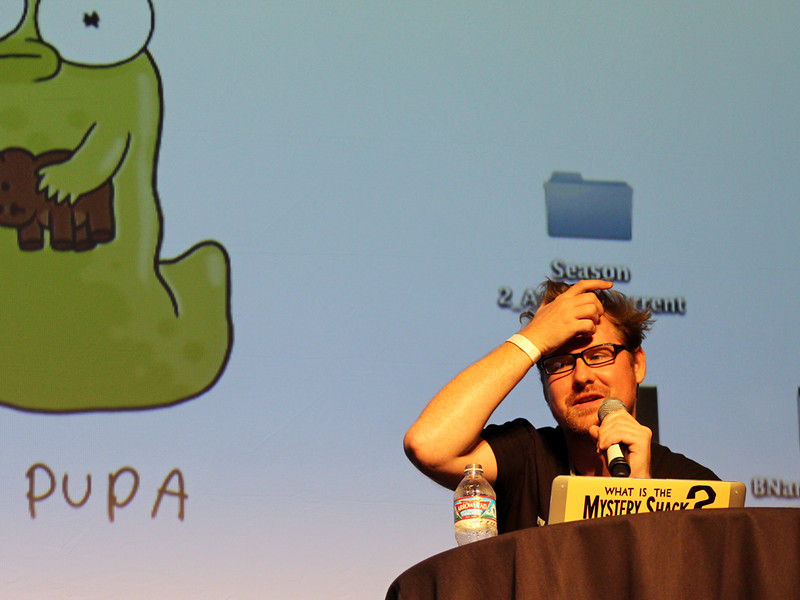
By Veronica Brinkley
If you’re like me and you consume a lot of media in your day-to-day life, you’re probably no stranger to that sinking feeling you get when you find out a creator you support has done something reprehensible. For me, this phenomenon often taints the art itself. Jokes I saw as harmless now seem malicious, lyrics sound condescending, and I interpret certain symbols extremely differently. Every time it happens, I also launch myself into an internal debate: Is it ethical for me to support this content? Is ethical consumption even possible?
I was thrust into this debate most recently while following the show “Rick and Morty.” An animated adult TV show created by Justin Roiland and Dan Harmon on Adult Swim. A hit since 2013, it has amassed a cult following of young people (usually stoners let’s be honest) who appreciate its twisted comedy and addictively annoying voice acting. For years, I have been a fan of both the show and Roiland’s later project, “Solar Opposites.” Both of these shows offer a satirical take on science fiction, inspired by iconic pieces of sci-fi like “Futurama” and the “Back To The Future” film series. The fate of these two shows — along with all of Roiland’s other projects — has come into question in the past few months, as Roland has been charged with domestic battery, corporal injury, and felony false imprisonment against his ex-girlfriend, according to NBC.
Upon learning this information, I was immediately met with an oh-so-familiar feeling of disappointment and frustration. Roiland was touted for years as one of the main creative minds behind these shows, and I respected him and Dan Harmon as showrunners. But as often happens with scandals, Pandora’s allegorical box has opened up. The Hollywood Reporter reports that Roiland has hindered “Rick and Morty” more than helped it in recent years. Co-workers say he rarely shows up to work, and when he does he is childish and unhelpful. Even worse, he has been accused of gross misconduct toward female employees including sexual harassment in Instagram DMs and inappropriate workplace comments.
In response to his egregious behavior, Adult Swim has cut ties with Roiland; he’s no longer associated with “Rick and Morty” or “Solar Opposites.” Adult Swim addressed the situation on the “Rick and Morty” Twitter account, saying “Adult Swim had ended its association with Justin Roiland. Rick and Morty will continue. The talented and dedicated crew are hard at work on Season 7.”
But Roiland voices both Rick and Morty themselves, as well as alien scientist and family patriarch Korvo in “Solar Opposites”. While it seems Roiland has minimal creative oversight and input, the iconic voices of the characters have deeply defined the shows. Personally, I cannot imagine Rick or Morty with a different voice. They wouldn’t be the same characters!
Either way, watching the show feels different now. Even though Roiland is no longer a part of the creative process, I feel a degree of culpability for supporting and consuming the content. While the actions of one individual do not discredit the talented writers, producers, and animators that still make the show, it is difficult to separate Roiland from the show. To support the other talented showrunners is to support Roiland. It’s almost a paradox of guilt and moral reasoning
Again this moral quandary reached the public sphere in the last few weeks as “Hogwarts Legacy,” a video game based in the Harry Potter universe, was released. Harry Potter’s creator, JK Rowling, has been involved in many controversies over the years as she has become publicly transphobic and a self-proclaimed Trans-Exclusive Radical Feminist (TERF). I find this behavior disgusting and unforgivable, especially when committed by someone with such a massive platform of young, often queer and neurodivergent people. Despite her behavior, the game was a commercial success, reaching the top of Steam charts, according to Forbes. Rowling, who is already a near-billionaire, has directly profited from game sales which has sparked online discourse surrounding the ethics of purchasing the game.
This phenomenon will continue to happen over and over again, often behind the scenes and in ways the public will never see. Now, I’m not here to tell you that you shouldn’t play the “Harry Potter” game, or that you should feel guilty if you do. I know for many people in my generation Harry Potter is a reminder of childhood, of a simpler time, and I am not trying to take that from anyone. Nor am I suggesting a boycott of “Rick and Morty” or any media in a similar situation. In fact, I would argue that it is nearly impossible to engage solely with ethical media. I do not offer a solution to this issue, and I’m not sure that there even is one. However, I believe it is very important that we are all conscious of the people behind the media we consume and the rhetoric we are buying into. Know who you are supporting, and be aware of how their beliefs affect what they create. Mitigating damage is crucial as well, and we should all do what we can. If you are thinking of buying “Rick and Morty” merchandise, for example, I suggest looking for it secondhand; this allows you to support the show without putting money directly into Roiland’s pockets.
Next time you are wondering about supporting ethically compromised media and creators, remind yourself that these projects are not a one-person show. You’re also supporting a crew of smaller artists, designers, animators, actors, creators, and many more crucially skilled individuals. While this does not take away from the moral ineptitudes of the creator, it allows for a nuanced perspective on a complicated gray area in media.
